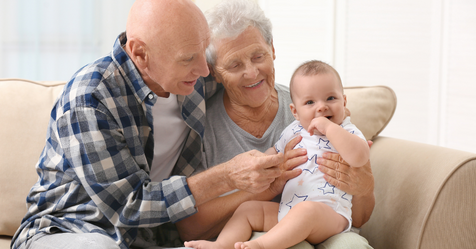|
The birth of a baby brings about significant changes to new parents - changes to their identities, their life-responsibilities and their relationships. The same can be said for new grandparents. At a time when they may be appreciating a new-found freedom, new grandparents face a re-orientation towards participating in their children’s and now grandchildren’s lives.
New parents are often exhausted, vulnerable, and desperate for practical and emotional support. They can hold expectations of their families based on assumptions they haven’t verbalised. As a result, new parents can feel disappointed when these expectations are not met. Similarly, when a baby is born, new grandparents can hold their own ideas about their grandparenting roles and about the involvement they wish to have in the lives of their children’s offspring. Some grandparents can feel shut out of their grandchildren’s lives, and others can feel overly responsible to be available at all times. What about when there are no grandparents? Although family dynamics can be complicated, some new parents have no family support and can feel alone and isolated. For these families, the charity organisation, Caring Mums, trains older mums who volunteer their time to make weekly visits to families needing practical and emotional support. As part of their training, these volunteers learn to withhold their opinions, and to focus on fostering confidence in new parents, by supporting them to find their own way with their babies. I was invited by Caring Mums to give a fundraising talk, entitled “Grandparenting in the 21st Century”. Drawing from many years as a perinatal (pregnancy and postnatal) psychologist, I had heard many stories about the ways in which grandparents become involved in families’ lives – in some cases providing invaluable support and fostering beautiful relationships with their grandchildren, and in other cases being uninvolved or even undermining the parents’ wishes. Needless to say, I had much to draw upon. However, prior to the talk, I decided to do a little additional research. I posted a question on a mother-baby social media site asking mums to share their experiences regarding the “Dos and Don’ts” of grandparenting - "...what helps and what hinders?". Many mums responded, both publicly and privately. I collated their responses and shared this list with the grandparents who attended the talk. • Call before coming over • Only give advice when asked • Ask what support is needed • Just help, don’t offer • Help with practical tasks such as cooking, shopping, washing • Never do our washing • When visiting, bring a meal • Just do what needs to be done • Ask before you do things around the house • Don’t take the baby unless asked to. Let the new parents learn about their baby and develop good bonds • When you come over, offer to take baby and let Mum shower • Turn visitors away in the first 3 weeks • If you had a similar problem, tell the parents what you did, not what they should do • Get your vaccines done • Give predictable times when helping with grandchildren • Don’t compete with the other grandparents • Remember things have changed since you had children • Don’t say “we survived without….”, “we never did…..” • Don’t stay all day or expect to be waited on • Don’t force children to kiss/hug you • Babysitting is a privilege not a right • Listen without trying to solve problems • Don’t criticize without giving a solution • Don’t criticize! • When we do things differently to you, don’t take it as a personal criticism • Don’t judge a messy house • Don’t talk about mum’s pregnancy or post-baby weight • Don’t say “my baby” • Stick to the same rules as the parents • Don’t undermine the parents’ rules • Don’t give junk food to children if parents have asked you not to • Don’t say to the child “I’ll get into trouble if I give you that” • Do special things with the grandchildren • Tell the parents they are doing a good job Two things struck me 1. There were obvious differences among mums about what constitutes support. Largely, the differences around asking about what can be done versus just doing it. Differences were evident between mums regarding the things they feel comfortable about grandparents doing for them. What is helpful and non-judgemental to one woman can be considered to be intrusive and laden with judgement to another. 2. When I shared the list of “Dos and Don’ts” to the grandparents who attended the talk, it was met with a resounding applause. The grandparents in the group agreed wholeheartedly with these requests. I was surprised. I was expecting to be met with some defensive responses about grandparents feeling used or misunderstood. But this was not the case. These grandparents agreed that the requests were reasonable. Now it could be argued that the grandparents who chose to attend this talk were a group who had put a lot of thought into their grandparenting roles already - a group who had considered carefully how to best support their offspring and grandchildren. A group interested in doing the best they could as grandparents, hence their attendance at a talk such as this. What I discovered Notwithstanding that I may have struck a particularly supportive group of grandparents, a number of things became evident from my informal research across both groups:
Take home messages There is an intrinsic complexity in these relationships, given the shared histories (joys and hurts) between grandparents and their children (the new parents). But what can we learn from what parents and grandparents told me? 1. Don’t assume As was evident in the list, what is helpful for one person might not be helpful for another. Everyone is different. Similarly for grandparents, the role and the extent to which grandparents want to be involved differs from one grandparent to the next. It is not helpful for either party to assume that they know what the other is thinking, expecting or wanting. 2 Communicate It is vital to talk to one another. When grandparents ask the new parents what they can do to help, this communicates not only a willingness to offer practical support, but it allows grandparents to tune in to their adult children’s needs and to really be there for them at this challenging time. It is ok for grandparents to express their desires to help as well as their conflicts around not wanting to interfere. This may be better for new parents to know as opposed to grandparents holding back, leaving new parents to make assumptions (e.g. “they don’t care”). Similarly, it is ok for grandparents to put limits on their time. In fact, many new parents have told me that they appreciate knowing what the grandparents feel is a reasonable amount of time spent with the grandchildren. Many new parents appreciate a predictable commitment of time so they can schedule breaks or time to get things done. And this can give grandparents precious time alone with their grandchildren. Parents crave respect for their parenting choices, particularly when parenting opinions and judgements are rife in their everyday lives. They may ask for the grandparents’ opinions and they may not. This is their time to discover what works and what doesn’t. Remember, parents want to do what they believe is best for their child. Summary Sleep-deprived new parents can feel sensitive to well-intentioned comments or perceived judgements by grandparents. Many new parents grapple with defining the kinds of parents they want to be to their child. Their values come in part from what worked and what didn’t work for them in their childhoods. As this unfolds, closeness, differences, unresolved issues and stress can be triggered between new parents and grandparents. Parents, tell grandparents what is helpful. More often than not they are wanting to do what helps, but they get can get it wrong when their actions are based on assumptions. Show them that you appreciate their efforts. Encourage them to forge special relationships with their grandchildren. Let them have some autonomy in their grandparenting without compromising the things that are really important to you. When you are not happy with something they are doing or not doing, express it in a calm, respectful way. Parents, remember that grandparents have done their hard yards in parenting and working. Check in on how involved they want to be with the grandchildren. Respect this time in their lives by asking for help, not expecting it, and by showing your appreciation when you receive it. Indeed it could be argued that grandparents' care of your children is a “privilege not a right” - your privilege. Grandparents, remember that parents won’t get it all right (they are human, just like you). They will be stretched physically and emotionally as parents. They need to know that you are there, and that you care. If they want your advice, let them ask for it. If you want to give advice, ask them if they would like to hear it. Conclusion Parenting and grandparenting are profound roles that shape families and leave enduring memories in children’s lives. Consider how you would like your children and grandchildren to remember family life. Share these goals with one another, express yourselves respectfully, show gratitude, and look after one another. Written by Dr Renée Miller (Perinatal Clinical Psychologist) Founder of the Antenatal & Postnatal Psychology Network Thank you to the mums who generously shared their experiences on Babies Toddlers Kids Melbourne. Thank you to the grandparents who attended the fundraising talk for Caring Mums, who shared their compassion and wisdom. Further information about Caring Mums and donations to this important charity can be made here. Worry strikes us all, particularly in the childbearing years.
Women who are trying to conceive can find the two-week wait interminable. A time when worry and fear can ramp up, out of control. The mind can become consumed by fearful thoughts. "What if I'm not pregnant?", "What if I'm going to need IVF?" "What if we can't have the family we've always dreamed of?" When pregnant, waiting for a scan, can mess with your mind. "What if there's something wrong with the baby?" "How would we cope?" Women (especially those who have experienced a previous loss) can find themselves agonising over fears about something being wrong with the baby, of losing the baby, or of having a negative birth outcome. Then, when we become parents, the worries can be endless. "What if he doesn't sleep tonight?" "What if there's a developmental problem with my toddler?" "What if my child doesn't have friends?" What if my child becomes a bully?" The fact is that any thought that begins with "what if" is by its very nature, not true. That doesn't mean that bad things don't happen. They do. But more often than not, our worries don't end up manifesting. And when bad things happen, we attend to the situation, drawing from our internal and external resources to cope, and we deal with what is actually happening. Worrying endlessly about things that could go wrong, is mentally exhausting. What people often don't realise is that we can manage our minds better than we think we can. The first step is to recognise that our thoughts are not truths. When we worry about a future scenario that hasn't happened, we remove ourselves from the life we have right now. "What if" thoughts make us feel anxious and stressed. People typically look back at their worries and wish they hadn't wasted all that time fretting. So how do we manage fear and worry? What do we do when "what if" thoughts (or fears about the future) intrude? This short video uses a Mindfulness-based, visual approach to help you to manage your worry and tame your mind. It takes practice, but you can do it! Click on this link: https://www.youtube.com/watch?v=QWrTcLmj6yI Written by Dr Renée Miller Perinatal Clinical Psychologist Antenatal & Postnatal Psychology Network Conception, pregnancy, childbirth, the postnatal period, and the early parenting years can pose difficulties for many people. Researchers and practitioners need to stay abreast of the experiences people face to continue to update their understanding of how best to support people with such challenges.
Back in 2001, over 300 new mothers participated in my research study - for which I will be eternally grateful. As a result, the findings of this research furthered our understanding of postnatal anxiety, at a time when postnatal depression had received the preponderance of postnatal research, and anxiety was conspicuously lacking in research attention. Ongoing research is vital for practitioners and policy makers to integrate people’s lived experiences into the work and support they provide. The psychologists at the Antenatal & Postnatal Psychology Network are passionate about facilitating the collection of data for researchers whose research studies support the mental health of perinatal women, men, couples and ultimately, children. How you can help Do you have some time to participate in a research study that could further inform practitioners who work with hopeful parents, pregnant women, birthing women, women and partners in the postnatal period, and early parenthood? The Antenatal & Postnatal Psychology Network provides an online research portal for academic researchers (in the perinatal field) to post their studies, giving visitors to the APPN site the option of supporting research, and striving for further meaning from their personal experiences. Studies requiring participation Under each listed study, you will see the participants being sought. If you meet the criteria for participation, you will find links to the study on our website here. RMIT Perinatal Well-being Study investigating challenges in pregnancy and the postnatal period. Participants required: Women who are pregnant to 24 months postnatal. Griffith University investigating the acceptability and outcome of an exercise intervention using a telehealth app for mothers with Postpartum Depression (PPD). Participants required: Women in the postnatal period who have been diagnosed with PPD or who are willing to seek a diagnosis. University of Tasmania investigating women's experience of pregnancy and the postnatal period. Participants required: Pregnant women living in Australia. University of Adelaide investigating the experience of culturally and linguistically diverse (CALD) men who have experienced the loss of a baby. Participants required: 1) Culturally and Linguistically Diverse (CALD) men with experience of perinatal death. 2) Healthcare professionals who have worked with CALD men following perinatal death. 3) Community Leaders from a CALD community. Monash University investigating how a music-based intervention supports the quality of parent- and caregiver-toddler relationships and toddler and parent/caregiver mental health.Participants required: Parents or primary care-givers of toddlers. Latrobe University investigating the effectiveness of a new program that aims to enhance parents’ support and understanding of their baby’s early social and language developments. Participants required: Pregnant women with a family history of autism, ADHD or intellectual disability Parent-Infant Research Institute investigating the benefits of psychological treatment for depression in pregnancy, for both mother and baby. Participants required: Women up to 30 weeks pregnant who are feeling low. Charles Sturt University investigating childbirth experiences and trauma in first time mothers. Participants required: First time mothers over 18, who have given birth over one month ago at 37+ weeks gestation. University of Queensland investigating resilience to stress, in families following preterm birth. Participants required: Parent of a preterm infant, child, or adolescent who is now 0-18 years of age. QUT Investigating how mothers use social media and what effects social media use can have on mothers. Participants required: Mothers of children aged between 0-4 years. Melbourne University undertaking Delphi expert consensus study: Establishing expert consensus about interventions for preventing and ameliorating the impact of Adverse Childhood Experiences. Participants required: Health practitioners, educators, policy makers, researchers or program managers whose work relates to family or child health and well-being in Australia. Royal Women’s Hospital & Monash University evaluating different approaches to improving sleep for first-time mothers who currently experience sleeping difficulties. Participants required: First-time mothers who are less than 32 weeks pregnant and currently experiencing sleep difficulties. University of Adelaide investigating experiences of Secondary Infertility: Emotions, Support and Coping Strategies. Participants required: Women and/or their partners who have tried unsuccessfully to conceive for at least 12 months after having had a successful pregnancy/pregnancies. University of Adelaide LGBTQI+ Experiences of Pregnancy Loss: Perceptions of Formal and Informal Support and the Impact on Mental Health. Participants required: People who identify as LGBTQIA+ who have experienced pregnancy loss more than 6 months and less than 10 years ago. University of Melbourne investigating women’s and men’s experiences of miscarriage, with the ultimate goal of ending the silence around miscarriage. Participants required: Women, partners and family members affected by miscarriage more than 3 months ago but within 2 years. Monash University. This study aims to understand how the brain changes in the transition to motherhood. Participants required: First-time mothers 10-14 months postpartum with or without a diagnosis of postnatal depression. University of the Sunshine Coast exploring the impact that fertility issues have on Australian's women's quality of life whilst trying to conceive. Participants required: Women currently trying to conceive, experiencing fertility difficulties. Deakin University investigating whether late pregnancy affects women's cognitive functioning. Participants required: 20 women in their third trimester of pregnancy and 20 women who are not pregnant, have never been pregnant and are not planning to become pregnant in the next 12 months. Latrobe University aiming to understand factors associated with well-being in same-sex attracted women during the perinatal period, to improve services for this group. Participants required: Same sex attracted pregnant women and new mums. Curtain University aims to establish a set of clinical guidelines for health professionals on the assessment, treatment, and management of individuals with perinatal OCD. Participants required: Parents with personal experience of perinatal OCD, and clinicians/researchers with expertise in perinatal OCD. Swinburne University explores the potentially different postnatal experiences of First-Time and Experienced Mothers, including well-being, feelings about motherhood and perceptions of Maternal and Child Health Nurse support. Participants required: All mothers who have had a baby within the last 2 years, are over 18 years of age, living in Australia, and speak fluent English. University of Liverpool is looking at how infant feeding attitudes change from pregnancy to the postpartum period. Participants required: Women in the third trimester of pregnancy (over 35 weeks). University of South Australia is looking at whether what you eat in pregnancy affects your mood during pregnancy and after. Participants required: Women who are 8-15 weeks pregnant at the start of the study (now). Bond University is conducting research on couples experiencing infertility in order to contribute to the development of helpful fertility related psychological support programs. Participants required: Couples experiencing infertility. CQ University's study Experiences of Pregnancy and the Year After Birth, is being conducted to further improve screening and treatments for perinatal mood disorders. Participants required: Women over the age of 18, who are currently pregnant or have given birth in the last 12 months. Please click here to check your eligibility to participate in one of the listed studies. Your experience could make an enormous difference to the experiences of others. Thank you for your consideration and potential contribution towards these important research studies. Dr Renée Miller Principal Clinical Psychologist Antenatal & Postnatal Psychology Network and The Perinatal Loss Centre "I feel like I have no control over my life" "The 'to do' list never ends" "I can't seem to finish anything I start" "My toddler is ruling the roost" "I'm trying so hard to be a good parent but I'm worried that I'm not" "I'm exhausted" Parenthood is stressful. The responsibilities and demands of a baby, toddler (or both), the sleep deprivation, the loss of freedom, the loss of control, and the never-ending 'to do list' can be overwhelming and stress inducing. Not to mention the emotional investment in wanting to parent a child who will feel safe and secure in the world, with a high emotional intelligence and a resilience to facing life's challenges. It's a big gig!
The Coronavirus Pandemic has added further stress and uncertainty for new parents. Fear of the virus itself. Lockdowns. Border closures with families elsewhere. Isolation. Working from home. Job loss. Financial pressure. Some new parents seek help to manage postnatal depression and/or postnatal anxiety. However many new parents seek help simply to manage stress. Often motivated by wanting to be the best parents they can be, parents recognise when they are operating in a revved up state. Their sleep can be affected, and they may notice symptoms of irritability, being overly touchy or sensitive, snappy, and generally not being able to wind down. Parents often report that their stress is most apparent in their relationship with their spouse, and/or in an increasing impatience with their children. There is a vast literature and much media attention educating the public on postnatal depression and more recently, postnatal anxiety. However for parents who are stressed this focus on depression and anxiety can result in a hesitation towards help-seeking in the absence of a depressed mood or an anxiety disorder. Postnatal stress can cause significant upset in families, and evidence-based treatments for stress can bring about welcomed symptom relief. So what is the difference between depression, anxiety and stress? According to the authors and researchers of the Depression, Anxiety Stress Scales (Lovibond & Lovibond, 1995) depression, anxiety and stress can co-occur, however each state has its unique symptoms. Depression symptoms include feeling negative, down-hearted, gloomy, unmotivated, dispirited, and a loss of enjoyment in things once pleasurable. Anxiety includes physiological symptoms of panic, pounding heart, shakiness, fear of losing control, and apprehension. Stress includes nervousness, jumpiness, tension, getting easily upset or irritated, and difficulty relaxing. The Psychologists at the Antenatal & Postnatal Psychology Network (APPN) commonly use the Depression Anxiety Stress Scales (DASS-21) - a well validated screening tool that helps new parents to understand their particular symptoms. In our experience, new parents like to understand their symptoms using the DASS-21, and they find it useful to track their symptoms over time to see how they are progressing with therapy. Although scores on the DASS can delineate symptom severity and a measure of progress over time, clinical diagnoses (if relevant) require further assessment by the psychologist to ensure that appropriate treatment strategies are implemented in therapy. Treatment for stress typically involves a combination of Cognitive-Behavioural Therapy and Mindfulness based therapies. These approaches give parents tools for understanding how their thinking - expectations, appraisals and worry - contribute to their difficulties (thinking being a modifiable component in managing stress). In addition parents learn to manage their responses (physical and behavioural) in relation to life stressors and to their own fears. Practical strategies for managing daily routines can form part of the work, as well as sorting through family of origin dynamics that may underly one's problematic thinking and stress levels in the early parenting years. Learning how to wind down and relax is fundamental to this therapy for stressed new parents and parents of young children. Written by Dr Renée Miller Principal Clinical Psychologist Antenatal & Postnatal Psychology Network As the Principal Psychologist of the Antenatal & Postnatal Psychology Network, part of my role involves communication. Communication to the public about specific help that is available for issues surrounding fertility, pregnancy, perinatal loss, the postnatal period, and the early parenting years. Communication about the importance of help-seeking at these vulnerable times in life. And communication that involves reassuring people that they will be met with acceptance, non-judgement, a deep caring for the fragility of the human psyche, and a belief in the capacity for human growth. In my communications role, I made the assumption that inclusivity was a given. That without judgement, we see any woman, any couple, and any formation of a family. That people are people with similarities and differences, with every person being a unique compilation of their past experiences, temperaments, likes, dislikes, preferences, fears, aspirations, disappointments, and life challenges. I used to believe that a person's sexuality was just one of the things that makes them uniquely who they are, in combination with their past experiences, temperaments, likes, dislikes, preferences, fears, aspirations, disappointments, and life challenges. With the therapeutic lens fixed squarely on the individual person in the therapy room (and the presenting issues at hand), I never saw the need to articulate that "we see same sex attracted clients", or "gender diverse clients". Indeed, I felt that stipulating this on our website, was in itself making a sexuality distinction where none was required - a potential discrimination in a back-to-front kind of way. In a similar way, I didn't see the need to state that we see people from all cultures, from all religions. Of course we do! It's our job to understand the unique aspects of the individual, who that person is, the formation of their identity, how they think, what they feel, where they've come from, what has influenced their past and current struggles, and what they want in life. My rationale was that we see women, men, and couples, for issues surrounding donor conception, for support through IVF, single women, women with fertility issues, women experiencing reproductive loss, women struggling in pregnancy or the postnatal period, and parents dealing with parenting difficulties. So why did it matter if the woman, or the couple was same sex attracted, or gender diverse? Then we invited Jacqui Tomlinson (from Rainbow Families) to talk at our Mental Health Professionals Network meeting about same sex attracted couples, IVF and loss. It was here that I appreciated the extent of the anxiety that same sex attracted/gender diverse people can feel when seeking a health professional (especially around creating a family in a heteronormative culture). When Jacqui spoke about the fear that LGBTQIA+ people can experience around not being accepted, or being treated with disdain (even by health professionals), I recognised that by virtue of their minority status, and the wounds they may carry from backgrounds of discrimination or lack of acceptance, inclusivity needed to be stated. LGBTQIA+ people need to know that we see you, we accept you, we respect you, and we welcome you, with your human frailties, your identity wounds and your capacities for resilience. Like all people from all backgrounds your identity is central to your experiences of conception, pregnancy, perinatal loss, and parenting. Whether you are doing it solo or in a gender diverse relationship, whether you are using a known or unknown donor, or surrogate, we are here to understand who you are and what you are experiencing, without judgement. We get the unique difficulties faced by LGBTQIA+ people including the prejudices of some people regarding the creation of rainbow families. We get that the sad irony of societal homophobia is that some queer people unconsciously internalise heterosexist ideas, believing that they do not have the right to be parents, that they won't be good parents or that they have to be 'perfect' parents. When there are difficulties in the childbearing years (which there are for many of us), these deep seated schemas can be sitting just under the surface of one's struggles. We get that same sex/gender diverse couples can experience some of these difficulties:
So now, as the communications person for the Antenatal & Postnatal Psychology Network, not only do we overtly state this inclusivity on our website, we ensure that our ongoing training and professional development includes LGBTQIA+ specific topics, and that LGBTQIA+ populations are represented in the topics we cover.
Written by Dr Renée Miller
Principal Clinical Psychologist Antenatal & Postnatal Psychology Network In many ways, new fathers appear to have it easy. They are spared the physical and emotional discomfort of pregnancy. They don’t endure the pain of childbirth. They also don’t spend the weeks and months of new fatherhood trying to get used to a body that has inextricably changed and no longer feels familiar. While men don’t have the physical signs to show for it, the transition to fatherhood is no less profound, exhilarating, and daunting. In my work with new parents, I am often reminded that the feelings and worries experienced by dads can be somewhat overlooked. What’s more, a lot of men have trouble talking about them. What is my Role?
Some fathers question their roles in the early weeks and months, when typically mothers are the primary caregivers. As a new father it’s easy to feel a bit left out. However, research tells us that fathers’ relationships with their newborns make a significant impact right from birth. Actually, it starts long before birth, because babies begin to recognise their father’s voice at around 22 weeks of pregnancy. So when that bump starts to grow, it’s time to get talking. The most important thing dads can do for their newborns is to simply spend time with them – cuddling, rocking, talking, singing, and settling. Getting to know each other in a hands-on way is good for everyone. For inexperienced dads, on the job training is the best confidence and relationship builder of all. And the benefits for babies are vast. Several studies suggest the quality and quantity of baby-father involvement directly impacts language development and children’s sense of security growing up. There is also research showing that babies with strong attachments to their dads tend to have fewer behavioural problems later on. Not surprisingly, research also tells us that when mothers view their partners as competent - when they provide encouragement, and believe that parenting is a joint venture - men are more likely to be involved and value their roles as fathers. The key is mothers viewing their partners as competent. This is an issue many couples struggle with, and it comes up regularly in my work with new parents. Because mothers tend to spend more time with their newborns than their partners do, they clock up many more practice opportunities, and can feel that the way they have learnt to do things is the only way. So whether it’s changing nappies, settling a fussy baby, or managing the bath routine, dads can easily get left behind in the skill development stakes. An all too frequent result can be mums hovering on the sidelines offering unsolicited advice, or worse, taking over and doing it ‘properly’ themselves. The result? Dads can feel inadequate, resentful, and less motivated to try the next time. The impact of not letting dads learn on the job can be mums feeling unsupported. Where has my relationship gone? Becoming parents calls for huge adjustments in relationships. Changes in roles, workloads and finances, not to mention the sheer exhaustion of caring for a baby. These pressures can impact even rock solid partnerships. Worries about how a baby may or has changed their relationship are among the most frequent concerns voiced to me by fathers. Some fathers experience feelings of helplessness as they watch their partners overwhelmed by tiredness, or having difficulties breastfeeding. Some women experience postnatal depression, and dads often feel at a loss as to how to ‘fix it’, feeling inadequate that they are not being able to make everything OK. For other dads, it’s the loss of emotional connection that has been chipped away by the constant tension of tiredness and frayed patience. They can feel like they’ve lost their best friend amidst the unfamiliarity and daily grind early parenthood can bring. Some fathers talk about feeling in competition with their babies - for time, attention, and affection. Even while understanding their partner’s all-encompassing focus on their baby, dads can feel invisible or fearful that there’s not enough love to go around. The reality of course, is that the birth of a baby can test even the strongest relationships. Even good relationships can stumble under the weight of it all. But the good news is that the overwhelming majority tend to bounce back again once everyone is getting more sleep, things settle down, and issues like sharing the workload are resolved. Remember, parenting is a marathon, not a sprint. It takes time and practice for both of you to adjust to being mum and dad, to learn the ropes, and to find space in there for each other. Here are some points to consider: · Communicate with each other. It’s a vital ingredient in sharing your worries and doubts, asking for support, and working as a team · Practice empathy which means being open to each other’s experiences and feelings, especially the ones that are different to yours · Avoid competing about who has it tougher – nobody wins this one and it’s a certain resentment builder · Seek professional support if worries become too big, anxiety or low mood become habitual states, or you need help adjusting to the change. Remember, dads experience postnatal depression and anxiety too. This post was written by Dr Karola Belton Clinical Psychologist Antenatal & Postnatal Psychology Network You are parents now, and things have changed with your mother in law.
As a psychologist who specialises in working with new parents, I often hear stories about fractured relationships with mothers in law once a baby comes along. Here are some of the reasons why. I feel constantly criticised by my mother in law. She often says "when MY kids were little... You can finish that sentence with any number of things her children did perfectly (compared to mine). My mother in law makes snide remarks about how uptight we are as parents. It seems that anything we do with our baby - that differs to what she did - is about us being anxious parents. I'm exhausted, and doing my best to manage the house, parenting and work. But somehow, I always fall short in my mother in law's eyes. In her recollection, her house was perfectly organised, and her children were perfectly behaved at all times. My mother in law runs a commentary about me through my children. "Oh, no, look mummy has made you cry again". She buys their affection by undermining me. It's infuriating. All I'm doing is setting boundaries for my children, and their grandmother tries to collude with them against me. My mother in law tells me I'm pandering to my son, and that he's going to grow up being a weakling. My partner and I are parenting consciously. We are aware that our son has a sensitive temperament, and we are showing him that we understand his difficulties, while empowering him to try new things. My mother in law thinks we should push him more. She says things to him like "come on, don't be a cry baby". We are a same sex couple. My mother in law constantly comments on how much our child looks like her daughter (the biological mother), and how lucky our daughter is to have her family's genes. I find this insensitive and cruel. The thing that drives me crazy about my mother in law is that she thinks she's the expert on feeding, sleep and safety. With no knowledge of current practices, she harps on about how things were done in her day. My wife and I pride ourselves on being informed about these things, and of course, we want what's best for our child. My mother in law competes with my mother. It's at the point that I have to hide and lie about some of the things I do with my mum. It started with my mother in law wanting to be in the birth. We said "no". Since then she has demonised me and blamed me for leaving her out of things. My own mother was not at the birth. She now calls my husband at work to complain about how little time she gets to see her grandchild. The difficulties I'm having with my mother in law are causing problems in my relationship. These are just some of the example of what people say. Can you relate? Part of my role as a psychologist is to help new parents to do three main things: 1. Differentiate your sense of worth from the comments or judgements made by your mothers in law. 2. Understand what your mother in law is saying about herself through her comments, rather than personalising her comments to mean something about you. This can be hard when you're a sleep deprived parent who is trying your best to manage the demands of a new baby, and determine how you want to parent. When there is a mother in law offering gratuitous advice, you may feel disempowered, feel like avoiding her, or quite frankly, enraged. Even if your mother in law is overtly critical of what you are doing as a mum, REMEMBER THIS:
Take a deep breath. It's your turn to parent now. You get to choose how you want to raise your child/children. To do this, it's important to be clear on your values as a parents, and for you and your partner to be on the same page. 3. Learn how to communicate assertively with your mother in law. This means respecting her view (recognising where it may be coming from). Then, confidently thanking her for her advice, while stating how you and your partner are choosing to parent. This may be different from her 'pearls of wisdom', but it's your child, your family. Also, be sure to thank her and let her know when her advice is helpful, bearing in mind that she does have experience as a mother, and we as parents, will never stop learning. Written by Dr Renée Miller Principal Clinical Psychologist Antenatal & Postnatal Psychology Network The Perinatal Loss Centre Life feels hard. You’re feeling anxious, stressed, overwhelmed. You’re feeling flat, lost, unhappy. You’ve been through difficult life experiences that are weighing you down. Perhaps you’re not functioning as well as you’d like to.
Let’s face it, we all struggle at times in our lives, especially when it comes to becoming parents, and everything that goes with this tumultuous life stage. You might be contemplating talking to someone, but also wondering “what would be the point?” “How could talking to a psychologist help me?” Nowadays we rely on reviews to find out about other people’s experiences. As psychologists, we are prohibited from eliciting and publishing client testimonials, making it difficult for people to find out how therapy works for others. However, the psychologists at the Antenatal & Postnatal Psychology Network constantly receive feedback from our clients about their experiences of therapy. So we decided to pull together feedback we’ve received over the years, to bring to light the commonly reported benefits of therapy. Please note that no identities have been revealed in the compilation of this list. The headings are written in the first person and are in no particular order. Feeling heard, accepted and validated Some people come to therapy reporting that when they were growing up, their feelings were not heard. With the best of intentions, parents can minimize or dismiss the feelings of their children, sending messages that their feelings are a sign of weakness, that they should just get on with things, or that their feelings signal catastrophe. Clients have reported that therapy provides them with a safe environment in which to identify and share their feelings. Once a good relationship and rapport has been established with their therapist, clients value that their feelings are accepted, are encouraged to be ‘felt’ (rather than shied away from or feared), and that their feelings are valid (“it makes sense that you feel that way”). Feeling ‘lighter’ by getting things off my chest In some instances, a client’s therapist is the first person to whom they have disclosed past experiences, distressing thoughts, or shameful feelings. By simply getting this information out, clients report feeling lighter – less consumed by their self-criticism, shame or fear of being judged. Within a trusted client-therapist relationship, repair can begin with the acceptance, validation and non-judgement the therapist brings. Learning that all feelings pass Interestingly, many clients report that being allowed to feel and express their feelings, along with having their feelings accepted and validated, provides an environment within which they learn that feelings evolve and change over time. By talking things through, feelings shift, and the intensity of the original feelings (often shame) diminishes. Understanding why I think and react the way I do In exploring the past, people learn about the ways in which they experience, and deal with their feelings – both internally and in relationships with other people. With insight into why they think and feel the way they do, their responses can be de-automated, giving them more choice and capacity to respond more adaptively. Clients learn to bring self-compassion to what was once habitual self-criticism. Recognising that my expectations and assumptions underlie my feelings and behaviours. In exploring the past, people learn about how their expectations were formed and how their expectations cause them to feel and react in certain ways. In therapy, clients learn to challenge their expectations, and to defer to their values as their guide, rather than to their habitual internal narratives. Examples of unhelpful beliefs: As a mother, I should know exactly what my baby needs at all times. If I can’t exercise 3 times per week, I won’t exercise at all. Everything I do should be done perfectly otherwise I’ve failed. If I don’t get enough sleep tonight, I won’t be able to function tomorrow. I am uninteresting to others, so I avoid meeting new people. My child should know to behave well when we go out. Examples of assumptions: She thinks I’m a terrible mum because she uses cloth nappies, and I don’t. My partner won’t know what to do if I leave the baby with him. The mothers at mothers’ group think I’m a bad mum because my baby cries more than the other babies. No one cares about my grief after my miscarriage. I’m a bad person because I had that awful thought. Learning to see another person’s point of view /emotional experience It can be enlightening when people realize that they have been making assumptions about other people’s behavior or responses to them. They learn that there are many potential explanations other than the ones they were subscribing to. When people learn about their own projections onto other people, they also learn that other people project their fears too. When clients see that everyone sees things from their own perspective, they can come to recognize that trying to please others is futile, and that even if theyarejudged by another person, this is tolerable. Learning how to live in the present and not engage in ‘what if’ thoughts Clients learn the value of living in the present moment, of asking themselves “what’s required of me now”, rather than entertaining a litany of catastrophic thoughts about what could go wrong in the future. With practise, recognizing and stopping “what if” thoughts can liberate clients from worry. Learning to accept what I can’t control Clients can become practised at recognizing what’s not in their control. As a result, they can develop more confidence about acting on what isin their control, and accepting what is not controllable. Learning of skills Skills learnt in therapy include
Overall, clients have reported becoming better versions of themselves - more tolerant of their own and others’ imperfections, feeling worthy of being cared for and seeing the value in caring for themselves. And, as a result, clients have reported an improvement in their moods and relationships, and a strengthening in their sense of selves and their meaning in life. Written by Dr Renée Miller Principal Clinical Psychologist Antenatal & Postnatal Psychology Network We live in a world where striving is seen as thriving. But is it?
We can become attached to the mindset of striving for more, striving to be better, striving for perfection. But at what cost? We develop expectations and desires that set us up to feel unfulfilled if things aren’t a certain way. We can hold high expectations of ourselves, our partners, our children, our parents, and our friends. We can feel disappointed and let down when people don’t behave in the ways we want them to. We can believe that if we don’t hold on tightly to our high expectations, we will in some way fail, our lives will be out of control, or that we don’t stand for much. Reflecting on two decades of working as a Psychologists with pregnant women and new parents, it struck me that much of people’s growth and happiness comes not from what they strive for, but from what they let go of. I turned my attention to my clients (no identities disclosed) and to our Facebook followers to find out what people have let go of for a happier life. This is what I found: As a parent I let go of striving to return to my pre-baby body, and decided to just maintain a healthy lifestyle. I let go of needing to clean and tidy my house before I'd have visitors, and now I don't care. I let go of apologizing for the mess in my house and now I say “you can see a lot of fun has been had around here.” I let go of expecting my child to get dressed by himself, and kept dressing him to get out of the house without shouting. Then one day, he said “I CAN DO IT!” I let go of comparing my house and my clothes to other parents. I let go of worrying about how other parents see me as a parent. I learnt to recognise that everyone is different and that everyone does what works best for them. I’ve let go of all the guilt I used to feel when failing to adhere to parental “shoulds”. I let go of expecting my kid to be like other kids or to fit the expectations I had of her based on my own interests and experiences. I let go of thinking I’d be happy when my daughter got through the present phase and into the next phase. Own behaviour I let go of trying to do so much. Once the kids are asleep I watch TV or read a book. I need some time on my own to relax. I let go of a high stress really well-paying job - working 12 hours a day every day even weekends to take a much lower paying job where I am just a regular worker rather than the boss and it’s made me the happiest I have ever been. I don’t even miss the pay cheque. I let go of feeling guilty for doing things I enjoy. I let go of trying to meet everyone’s needs before my own family’s. Now I tell the broader family what works for us and what doesn’t. I let go of the urgency I had felt to find my ultimate job when my babies were small. Now I say to myself “all in good time”. I let go of all the stuff around the house that I hadn’t used for a while, but was keeping just in case. I let go of ‘beating myself up’ if I said something inappropriate. We can all do that sometimes. If I offend someone, I apologize. I let go of worrying about the future. That was big! Social media I let go of checking social media through the day, and I’m now more present with my children. This makes me SO much happier. I’ve let go of connecting ‘likes’ on social media to my worth as a person. I let go of looking at my phone in bed. I’m enjoying reading books and talking to my partner instead. I recognise that what people post on social media is what they want others to see or think. I let go of letting other people’s ‘fabulous’ lives impact the way I see mine. Friendships Once I became a parent, I realised that my friends were busy with their children, and I let go of my expectations about how often we should catch up. I let go of needing my friends to be there for me when I was struggling, and realised that some people can be there, and other people find emotions hard to deal with. I accept now that some of my friends are just fun friends. I’ve let go of friendships which felt really hard to maintain or would leave me feeling exhausted afterwards (and they too have let me go). Relationship I let go of needing my partner to notice the mess, and just asked for what needed to be done around the house. I let go of trying to change my partner to mould him into what I wanted. I try to focus on all the positive things about him. I let go of needing things to be done in MY time (i.e. NOW) and recognise that people have different time lines. Parents and In-laws I stopped waiting for my mum to ask how she can help, and now I ask for help when I need it. I let go of needing my parents’ approval. I feel so much lighter and no longer worry about how they see me. I stopped wishing my parents could be tuned in to my feelings. I now realise they are both emotionally damaged, and don’t have the capacity to hear me or to validate me. Relationship with myself I let go of being unkind to myself. Self-critical thoughts were the most unhelpful and damaging thing I ever did to myself. I stopped comparing my life to others’ lives: My house, my car, my children, my husband. I let go of trying to prove myself to others. I’m honest about not knowing about certain things (like politics). I let go of thinking I had to constantly please others. So is all striving bad? Letting go for a happier life, does not mean letting go of all striving. It’s about letting go of the striving that comes at a cost. It’s about checking in on whether the expectations we hold are helping or hindering our happiness. It’s about letting go of the unhelpful ‘shoulds’ and ‘should nots’ that we’ve mindlessly accumulated over time or that 'belong' to other people. It’s about treating ourselves with kindness and compassion and measuring ourselves according to our values – what really matters. What have you let go of for a happier life? Written by Dr Renée Miller (Perinatal Clinical Psychologist) This article has been written in the first person to reflect the individual views of people whose identities have been protected. The problem with perfectionism is that there is no end to it. We may continue to strive to be better, but the goal posts keep moving, and perfection eludes us. Some people say that perfectionism has been a good trait in the workplace, something that has helped them to progress in their careers. Perfectionism shouldn't be mistaken for conscientiousness, drive, hard-work, commitment, care, or attention to detail. These qualities are certainly helpful in the workplace and in other settings. What this article is talking about is the extreme nature and bottomless pit of perfectionism. The kind of perfectionism that involves unrelenting expectations and standards for self and others, criticism of self and others, associated stress and anxiety, and commonly feeling dissatisfied or 'not good enough'.
Time and time again, we see new mums who with the best of intentions for their babies and families, are striving to be ‘perfect’ mothers – to parent in the ‘perfect’ way. The reason they are struggling, is often because this bottomless pit of striving sets them up to fail, and this perceived failure feels intolerable. There is typically a lifetime of layers beneath the surface of this striving, which is certainly worthy of exploration. Striving for perfection can seriously limit our capacity to enjoy life. Perfection-striving is often associated with all-or-nothing or black-and- white thinking. For example, the mum who won’t go to mother’s group if she is going to be late, misses out on the building of relationships with other mums (who are often late themselves). The mum who won’t exercise if she can’t exercise three times per week, misses out on the benefits of some exercise and a little time-out. The mum who won’t invite people over unless she gets the time to make the house look immaculate, misses out on the fun and spontaneity of having other new mums and babies around for her own and her baby’s social well-being. The mum who won’t let her partner settle the baby because he/she won’t do it like she does, misses out on her partner’s support and her partner's growing bond with the baby. The bottom line is that there is no one way, and there is no right way. When your hard and fast rules about how things should be, get in the way of the things that give your life meaning (i.e. the things that you really value) ask yourself if there is a middle ground? The middle ground is a place where we strive for being ‘good-enough’ mothers. Perfectionists usually see this term “good enough” as meaning mediocre. However, ‘good-enough’ means good enough. For example, getting to mothers group late is better than not going at all. It can be a good laugh and a supportive environment. Exercising whenever possible (despite wishing to achieve three exercise sessions per week) is better than nothing, and is likely to become easier to achieve over time. Inviting friends over, even if the house is untidy, shows them that you are human after all (very comforting for most people), and demonstrates that you value friendships more than your domestic high standards. Letting your partner settle the baby even if he/she does it differently to you, knowing that this is their chance to discover what works, and to establish a good bond. The middle ground is a much kinder place – a place of acceptance, and openness to experience. Try it. You’ll see. You might even find that not only can you be a 'good-enough' mum, you can be a great mum! If these tips are not enough, and your striving for perfection is causing you distress, it may be worthwhile to seek help. Written by Dr Renée Miller Principal Perinatal Clinical Psychologist Founder Antenatal & Postnatal Psychology Network Co-founder The Perinatal Loss Centre |
AuthorPosted by Dr Renée Miller Topics
All
|
|
We acknowledge and pay respects to the Elders and Traditional Owners of the land on which our psychologists practise.




















 RSS Feed
RSS Feed
